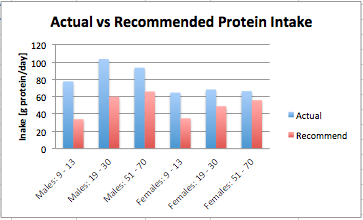The Dietary Guidelines Advisory Committee (DGAC,) has just dropped a 500+ page bomb on the meat industry. The report on dietary guidelines takes into account our consumption’s environmental impact says…
The major findings regarding sustainable diets were that a diet higher in plant-based foods, such as vegetables, fruits, whole grains, legumes, nuts, and seeds, and lower in calories and animal-based foods is more health promoting and is associated with less environmental impact than is the current U.S. diet.
Basically, eating fruits, veggies, and grains is good for our waistline and has a low impact on the environment; the current american diet (high in animal-based foods)… not so great… for either.
Let’s dig into the numbers a bit. The report frequently makes use of Appendix E-2.1. Page 4 of this report lists the mean (average) protein consumption for the various age groups in the study. If you compare these mean figures with corresponding recommended intake amounts from USDA’s Daily Recommended Intake (DRI) Calculator, you will see that the actual protein intake exceeds the recommended at every age/gender grouping. A link to the sample data points that I’ve checked, using the average height and weights of American Male and Females at their various ages, are below.
And here is a summary image of the data.
Sources


February 21, 2015 at 12:07 pm
I’m assuming that the point you’re trying to make is that we eat too much meat and the USDA, in all their good-natured wisdom and out of grave concern for public health, have crafted these guidelines after carefully examining the data of only the best randomized trials. Unfortunately, history and the current scientific literature both demonstrate that this belief is unfounded.
These guidelines are a joke. They’re based on large epidemiological studies where they tease out weak associations between what people eat (through unreliable dietary recall surveys) and outcomes such as heart attack, cancer diagnosis, and death (which can all be caused by myriad factors) after years of hands-off observation. This tells us nothing except how to construct a randomized trial, a real study, but the USDA for the most part doesn’t rely on those. So the research behind these guidelines is very questionable and in many cases has been proven incorrect.
It’s admirable that you stick to a vegan way of life and if it works for you, that’s great. But don’t make the assumption, as many do, that these guidelines are espousing a meat-free diet and are doing so with the backing of solid data. That’s just not the case.
http://www.skeptictaproom.wordpress.com
LikeLike
February 21, 2015 at 2:27 pm
D.H.,
I disagree. You said the research behind the USDA’s guidelines on Daily Recommended Intake “in many cases has been proven incorrect.” – Can you link me to an independent study that backs this up? Do you believe they’ve underestimated the DRI for protein? I would be especially surprised if this were the case.
LikeLike
February 21, 2015 at 2:57 pm
In terms of USDA nutrition guidelines, which espouse a low-fat diet comprised mainly of fruits, vegetables, and grains, and little in the way of meat, there are a number of trials that have tested these diets and come up with uninspiring results. Remember that these agencies recommend these diet as they believe, or simply want us to believe, that eating this way will delay disease and improve health. Here are a few trials that contradict this thinking:
-Women’s Health Initiative Dietary Modification Trial (https://www.nhlbi.nih.gov/whi/diet_mod.htm). Consider that this is eight years of follow-up on nearly twenty thousand women randomized to eat exactly the way the government wants. They found no effect. This one is pretty damning evidence. Please take the time to read it.
-Stanford A to Z Weight Loss Trial (http://jama.jamanetwork.com/article.aspx?articleid=205916). A comparison of four popular weight loss diets on their effectiveness for weight and other health parameters such as lipids and measures of insulin resistance. The Atkins diet, which is, at least in the initial phase, diametrically opposed to the USDA nutrition guidelines, enjoyed the best results out of the four diets. The other three diets were lower in fat and presumably protein.
-2013 meta analysis published in a peer-reviewed journal (http://www.ncbi.nlm.nih.gov/pmc/articles/PMC3636027/pdf/1475-2891-12-48.pdf) shows that there are no detrimental effects of diets higher in protein that what is typically recommended. Note, too, that the results show no inherent benefit to high-protein either. I’m not arguing that we need more animal protein in our diets to improve our health. I’m saying that there’s no need to reduce the amount of animal protein as it hasn’t (yet) been conclusively shown to be detrimental.
-Another meta analysis, this in the American Journal of Clinical Nutrition, arguably the most prestigious journal in this field, shows a hint of benefit for higher-protein diets compared to diets featuring the typically recommend amount: http://ajcn.nutrition.org/content/96/6/1281.long
-Two other longer-term randomized trials demonstrate the efficacy of low-carb, higher-fat, higher-protein diets, as compared to the typically recommended low-fat diet, in reducing weight and improving metabolic outcomes. Foster 2010 (http://www.ncbi.nlm.nih.gov/pmc/articles/PMC2949959/) and Shai 2008 (http://www.nejm.org/doi/full/10.1056/NEJMoa0708681).
Please also look into the research done by Jeff Volek and Eric Westman on low-carb diets available on PubMed. There are also other short-term trials available on PubMed that reproduce the results of much of the above research. Also, the works of authors such as Gary Taubes, Michael Eades, Steve Phinney, and Alan Watson are enlightening and filled with discussions of the relevant research. All in all, the literature on nutrition is, at the very least, extremely interesting. We can see some gaps between this data and what’s prescribed in the Dietary Guidelines. Hope this helps.
http://www.skeptictaproom.wordpress.com
LikeLike